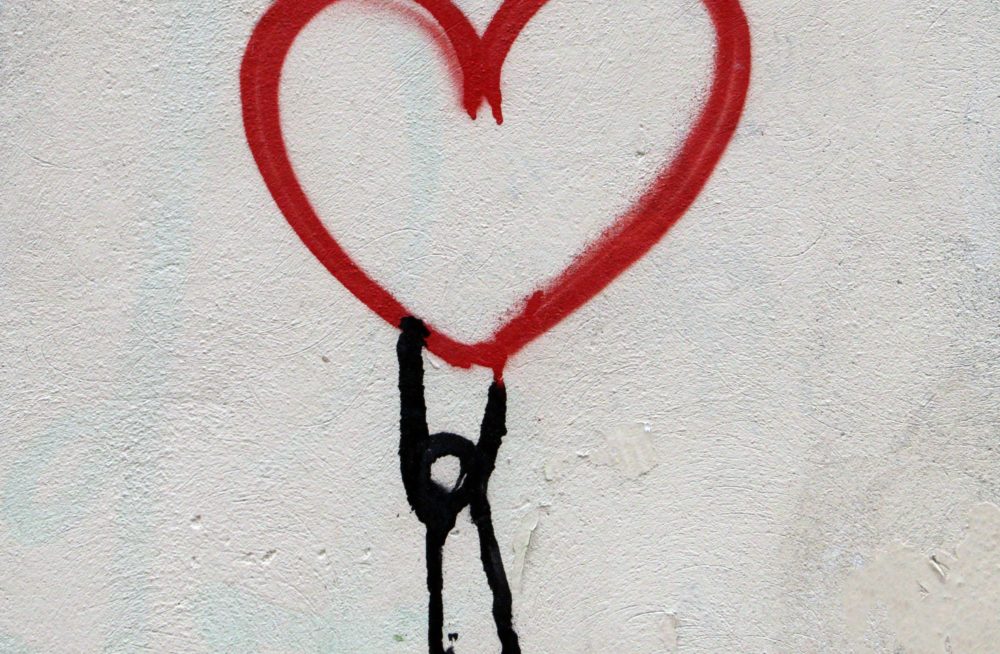The Buddha taught that three forms of right intention can help us practice well, and today we’re talking about the third: harmlessness. Bhikkhu Bodhi describes the intention of harmlessness as “thought guided by compassion, aroused in opposition to cruel, aggressive, and violent thoughts.” So compassion is the driving force behind harmlessness.
This compassion stems from our understanding that everyone longs to be free from suffering. EVERYONE. The more miserable the person, the longer the list of terrible things a person feels they’ve done, the more they long to be free from suffering. Since we are mere mortals, we don’t have the capacity to give that to them. We can’t alleviate suffering on a global scale. Let’s be honest: we can’t alleviate suffering in our own lives. But what we can do is offer compassion. We can notice suffering, be present to it, give space for it. And we can offer sincere compassion to those who suffer.
If we get ambitious about this, we can consider offering sincere compassion to everyone. Even the miserable people with the laundry list of bad things.
I get it: this is a lofty goal. It can also be a deeply unpopular thing to do. I’m not sure why we think offering compassion and hoping that all get free from suffering will cost us more than the cost of leaving everyone miserable. I suspect it’s because we don’t trust the goodness at work in the system, or in us. So I want to take just a moment and state the obvious about practicing harmlessness. It requires you, on some level, to believe that any intention arising from a desire to punish or harm, any intention that begins with its roots in violence or aggression, is NOT going to get us to a place that isn’t also vengeful, resentful, violent, or aggressive.
It. just. isn’t.
I wouldn’t have set up the world this way myself. I would prefer for my raging rants to create lasting change because they feel very satisfying. I’d feel so great about myself for setting people straight in such a direct, righteous kind of way. It pains me to say it, but this does not actually work. Please hear me: I am not saying we don’t hold people accountable, or set boundaries, or work every single day to disrupt corrupt and unjust systems of power. But the Buddha was a smart person, and Jesus was too, and they teach us that things will just go better for everyone if we begin with our hearts in love, in compassion. And it’s much better if we can somehow figure out how to stay there, too.
I’m going to be honest. I believe this 80%. (On my good days, maybe I reach 90%.) Most of the time, I believe that Jesus and Buddha and Ghandi and Martin Luther King and Archbishop Desmond Tutu and Saint Francis and just an endless roster of powerful women have been able to do this and bring about lasting positive change. Sometimes, though, I question if maybe we need just the tiniest little bit of harm. Just like, a pinch of harm, just to get things going. I don’t know if I will ever reconcile this. I don’t know if I need to. But in my clearer moments, I know there’s a difference between standing for something and seeing it create unintended harm, and starting from an intention to harm.
I am really trying to be the kind of person that doesn’t generally start from an intention to harm.
If we take anything from this form of Right Intention, maybe it’s just realizing that our intention to harm will succeed, and then we will have to accept that we brought more suffering into a world that already has too much. (When have you tried to harm someone and then felt like it backfired in compassion? Yeah, me neither.)
Practicing Right Intention requires us to notice our thoughts. So seeing where our thoughts that are cruel, aggressive, or violent is central to the practice. In other words: take time this next few days to notice your red buttons. But the intention of harmlessness also directs our actions. It reminds me of the paramita of discipline, where we learn this simple (yet difficult) mantra: Avoid doing harm. Try to do good. Seek the benefit of all.
If we truly want to do no harm, it only makes sense to begin by guiding our thoughts and intentions toward harmlessness.
I wonder if we can be brave enough to trust that our intentions for harmlessness could actually create the just, free, peaceful society we all long for?
This post belongs to my Eightfold Path project, where I’m practicing each step in the path. You can read all my posts on Right Intention here. And feel free to follow along on Twitter (@beasoulninja), or sign up to get my posts delivered to your inbox by signing up for my newsletter on the homepage and selecting “Posts.”




